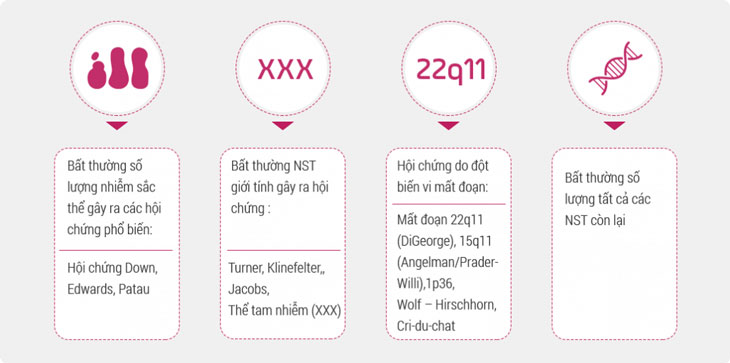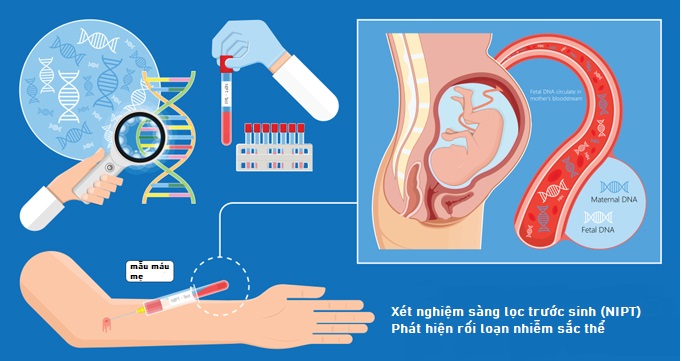In the realm of prenatal diagnostics, Non-Invasive Prenatal Testing (NIPT) has emerged as a groundbreaking method, providing expectant parents with invaluable insights into the health of their unborn child. In this comprehensive article, we delve into the intricacies of xét nghiệm NIPT là gì, exploring its significance, methodology, and implications.
Understanding Xét Nghiệm NIPT
What is Xét Nghiệm NIPT?
Xét nghiệm NIPT, or Non-Invasive Prenatal Testing, is a cutting-edge diagnostic procedure designed to assess the genetic makeup of a developing fetus. Unlike traditional methods that carry inherent risks, such as amniocentesis, NIPT offers a safer alternative by analyzing cell-free DNA circulating in the maternal bloodstream.
The Significance of Xét Nghiệm NIPT
Ensuring Early Detection
One of the paramount advantages of xét nghiệm NIPT là gì lies in its ability to detect chromosomal abnormalities early in pregnancy. This includes conditions like Down syndrome, Edwards syndrome, and Patau syndrome, allowing parents to make informed decisions about their child’s health.
Minimizing Risks
The non-invasive nature of this testing method significantly reduces the risks associated with more invasive procedures. Expectant mothers can now undergo genetic screening without the potential complications that accompany traditional diagnostic methods.
What is NIPT test?
NIPT test, also known as non-invasive prenatal screening, is a method to determine the risk that the fetus will be born with certain genetic abnormalities. This test analyzes small fragments of cfDNA produced by fetal cells and present in pregnant women’s blood, looking for chromosomal disorders.
This is a non-invasive test that only requires blood from the mother and does not pose any risk to the fetus. This method overcomes the risks affecting the mother and fetus of traditional diagnostic methods such as placenta biopsy or amniocentesis, providing accurate test results as high as 99.98%.
The NIPT test is performed at 9 – 10 weeks of pregnancy. From the results obtained, the doctor will advise pregnant mothers on timely interventions or treatment directions.
Why should you do the NIPT screening test?
The current NIPT test is capable of detecting fetal chromosomal abnormalities as follows:
- PATAU SYNDROME (extra chromosome 13) has symptoms: cleft lip, cleft palate, small eyes… 90% of children die in the first year after birth.
- EDWARD SYNDROME (extra chromosome 18) has main symptoms including: Short-term vision at birth, short stature, small head… Most often cannot keep the child during the fetal period or die in infancy.
- DOWN SYNDROME (an extra chromosome 21) causes: Flat face, stupidity, slanted eyes, brachycephaly,… even accompanied by mental retardation in children
- SEX chromosome abnormalities cause Triple X Syndrome (XXX), Klinefelter syndrome (XXY), Jacobs syndrome (XYY), Turner syndrome (monosomy Abnormal number of all remaining chromosomes: can cause infertility, birth defects, poor intelligence, slow development and involuntary movements in children

When should pregnant women have the NIPT test?
The Ministry of Health recommends that ALL pregnant mothers should have the NIPT test, especially paying more attention to pregnant mothers with the following characteristics:
- Pregnant women over 30 years old, especially over 35 years old: when pregnant women are over 35 years old, egg quality declines, increasing the risk of the fetus having chromosomal abnormalities.
- Pregnant women have high-risk fetal ultrasound results measuring nuchal translucency (>2.5mm), Double test and/or Triple test at high risk: When the fetal ultrasound result is abnormal, the doctor will prescribe the pregnant woman to do the test. NIPT screening
- The pregnant mother has a history of giving birth to a child with birth defects/has had a miscarriage: in this case the fetus is at risk of birth defects because it may be due to genetic abnormalities of the parents that have not yet been discovered.
- Pregnant mothers are exposed to radiation and toxic chemicals
- The pregnant woman’s family has someone with a genetic disease related to chromosomes
- Pregnancy cases using artificial insemination (VF)
NIPT testing procedure
- Step 1: Consult the NIPT method: The doctor examines and advises in detail about the NIPT test to help pregnant mothers understand the benefits of prenatal screening for the fetus. From there, mothers choose the appropriate and necessary screening package.
- Step 2: Take a blood sample from the mother: The doctor takes 7 – 10ml of blood from the mother’s arm vein for testing. The sampling process needs to ensure sterility and safety for pregnant mothers.
- Step 3: Blood sample analysis: The blood sample is sent to the Testing Center for analysis by technicians to detect abnormal signs related to the number of chromosomes.
- Step 4: Return results and explanation: Results are returned after 5 days of testing. In case the fetus is healthy and normal, the doctor instructs the mother to continue checking and monitoring the fetus in the following months. If the screening results are abnormal, the doctor will advise the mother on special care for the fetus, most suitable for the condition of mother and baby.

At Van Hanh General Hospital, NIPT testing is indicated from the 9th week, earlier than all other prenatal screening or diagnostic tests. NIPT testing is performed with an international standard laboratory system with modern technology, providing >99% accurate results. With a team of experienced and specialized doctors, we ensure accurate results and give the best advice to pregnant mothers.
Methodology of Xét Nghiệm NIPT
Blood Sample Collection
Xét nghiệm NIPT involves a simple and low-risk procedure for the expectant mother – a blood draw. This blood sample contains cell-free DNA from both the mother and the fetus, offering a wealth of genetic information without directly accessing the amniotic sac.
DNA Analysis Process
Once collected, the blood sample undergoes meticulous analysis. High-throughput sequencing techniques enable the identification of fetal DNA, allowing for a detailed examination of the chromosomal composition and the presence of any anomalies.
Importance of Xét Nghiệm NIPT in Pregnancy
Informed Decision-Making
Knowledge is power, especially when it comes to pregnancy. Xét nghiệm NIPT empowers parents by providing them with crucial information about their baby’s health, enabling them to make informed decisions regarding medical interventions or preparations for potential challenges.
Emotional Preparation
In addition to the medical benefits, xét nghiệm NIPT là gì also plays a pivotal role in emotional preparation. Understanding the genetic health of the fetus allows parents to emotionally prepare for any special care or support their child may need after birth.
Key Advantages of Xét Nghiệm NIPT
Accuracy and Reliability
Xét nghiệm NIPT boasts a high level of accuracy in detecting chromosomal abnormalities. This reliability provides expectant parents with confidence in the results, facilitating better decision-making throughout the course of the pregnancy.
Non-Invasiveness
The non-invasive nature of this testing method cannot be overstated. By eliminating the need for invasive procedures, xét nghiệm NIPT minimizes potential risks and discomfort for both the mother and the developing fetus.
Challenges and Considerations
False Positives and Negatives
While xét nghiệm NIPT is highly accurate, it is not without its limitations. False positives and negatives can occur, necessitating confirmatory diagnostic procedures for conclusive results.
Limited Scope
Xét nghiệm NIPT primarily focuses on chromosomal abnormalities and may not provide a comprehensive assessment of all potential genetic conditions. Expectant parents should be aware of the scope and limitations of this testing method.
Conclusion
In conclusion, xét nghiệm NIPT là gì represents a revolutionary stride in prenatal diagnostics, offering a safe, accurate, and non-invasive means of assessing the genetic health of the fetus. As technology continues to advance, the scope and reliability of NIPT are likely to expand, further enhancing its role in ensuring the well-being of both expectant mothers and their unborn children.
———————
📥 Van Hanh General Hospital with the criterion “Patients first”
⏱ ⏱ Over 20 years of treatment experience accompanying you to protect your health:
📞 Hotline 028.3863.2553
🌐 Website benhvienvanhanh.vn
🏫 Address: 781/B1-B3-B5 Le Hong Phong, Ward 12, District 10, Ho Chi Minh
